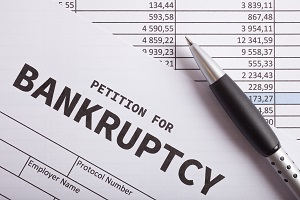The Creditors’ Role In Bankruptcy Cases
What Is A Creditor? How To Identify Them In Bankruptcy?
A creditor is somebody to whom you owe money, it could be a bank, or it could be your mom. If you have a credit card, say with capital one, then capital one is your creditor, if you make a mortgage payment to Mr. Cooper, then, Mr. Cooper and the underlying holder of the mortgage is your creditor.
When we are preparing to file bankruptcy we do a bankruptcy petition, and one of the most important things to include in your list of creditors is because those are the people that we want to notify of your bankruptcy.
The first thing we do is we pull a credit report and that’s going to give us a lot of your creditors, and it also gives us their addresses, so they get notice of the bankruptcy.

Many times creditors don’t show up on credit reports, or payday loans until they’re in a collection agency they usually don’t go on credit reports, medical debt before it’s been handed over to a collection agency, usually doesn’t show up there either, and starting next month it’s going to be banned to put medical debt and the collection agency that it’s assigned to on credit reports, so medical debt is not going to be on there either.
We pull the credit report but ask our clients to provide us with the names and addresses of all creditors.
We like to cast a wide net, if you think you might have debt but you’re not entirely sure, we don’t have to be super specific but we should list it, so if you think you took out a payday loan three years ago, we’re gonna list it, if you just recently went to the hospital but you don’t have your bill yet, we’re going to list it.
We just want to put everybody that you might owe money.
Identify Your Debts & Creditors For Your Bankruptcy Case
About a month after you file your case, you are going to have to appear at a hearing where you swear under oath that you have listed all the creditors that you know of.
You simply cannot without committing perjury, you can’t just leave somebody off, there’s not a salad bar bankruptcy option anymore, so you want to be careful and as long as you put forth a good faith effort, you’ve done your best to track everybody down, that’s good.
How Much Can A Creditor Garnish My Wages?
In Texas, only federal debt, like taxes, student loan debt, or child support, can be taken out of your paycheck.
In Texas, your general run-of-the-mill creditors cannot garnish your wages but that’s not true in most other states.
It’s a common thing that this is what pushes people to file a bankruptcy, all of a sudden, they’re going to lose up to 25 percent of their wages.
If their wages are getting garnished, it’s awfully hard to live on 75 percent of your income for that to happen.
The creditor has to file a lawsuit, and they get a court order allowing them to garnish wages, and then, they garnish up to 25 percent of your wages until the debt is paid.
Another thing we see in other states (not in Texas) is the creditor putting a lien against the real property, it’s called a judgment lien.
Again, they have to file the lawsuit, they get a judgment for the amount owed, and then, there’s a lien against the property, so that when you go to refinance or sell it, that creditor gets paid.
In Texas, we don’t see this either, here’s what happens in Texas to collect, the creditor has up to 10 years to collect, and they can get either a writ of garnishment or a turnover receiver with a writ of garnishment. They can go to your bank and sweep out your bank account.
They can’t garnish your wages but they can sweep out your bank account.
If they get the turnover receiver, then they can take your property and sell it to the creditors. There are processes involved with this but that’s how debt collection usually works here in Texas.
What Can Debt Collectors Do If They Come To My Door?
There are often debt collection agencies that have bought the original debt, or they’ve had the original debt transferred to them, and under federal law, you can ask for proof of that transfer, and they have to provide it to you within 30 days.
You can say: Are you really who you say you are? Show me, prove it; and they have to provide you the written documentation within 30 days.
If the debt collector comes knocking on your front door, you can inform them that it is inconvenient to be contacted at home, they’re allowed to do it but if you tell them, and then, you document that you told them that it’s inconvenient, they have to stop this.
This is one of the provisions of the federal debt collection and practices act, and they may not contact you at a time or a place that they know or should know is inconvenient.
If they continue trying to collect from you after you’ve told them this, you may be able to sue them for a violation of the federal debt collection practices act.
They also cannot contact you before 8 am or after 9 pm, either in person or on the phone. They may not harass you, they may not threaten you, and they cannot use profanity, so you have some good protections.
Is Chapter 7 Or Chapter 13 The Best Option For Handling Creditors?
They’re both equally good, no matter which Chapter you file, the automatic stay goes into place. The automatic stay is an injunction against collection activity.
That automatic stay goes into place, pretty much no matter what bankruptcy you file.
There are some exceptions, there always are, but just filing bankruptcy is what’s going to help you.
We can say that a Chapter 13 tends to hit your credit less severely than a Chapter 7 if you’re looking at rebuilding credit, but as far as stopping creditors from contacting you, a 7 or 13 is equally great.
Are Creditors Likely To Avoid Someone Who Has Filed For Bankruptcy Before?
There’s this notion that if you’ve filed bankruptcy it’s a financial death sentence, your credit’s going to be ruined forever, and you’ll never be able to get another loan; that’s not the truth.
If you have filed for bankruptcy there is no reason to expect that you would not be able to get another loan, so it’s not so much a matter of whether you’ve filed, it’s more a question of whether you have rehabilitated your credit.
People who are in Chapter 7 bankruptcy, oftentimes when they’re in the middle of Chapter 7, they get a lot of car loan offers and credit card offers, the reason is that these credit card companies and car loan companies know that you can’t file for another Chapter 7 for eight years, so they’re happy to collect all the interest they can get from you before you can discharge a debt, again, they know that you’re on the hook.

Mortgage companies like to see someone out of bankruptcy for two years before they approve a mortgage loan, and there are lots of other things that are available to you, so you will be able to get another loan after you have filed bankruptcy, whether it’s 10 minutes ago or many years ago.
Can A Creditor Sue Me To Stop Me From Filing Bankruptcy?
Not, you can file bankruptcy, and knowing no one can bar the door to the bankruptcy court.
Once you’re in bankruptcy, a creditor may ask the court to make the debt not dischargeable, and that’s a legal process that’s done within the bankruptcy.
The bankruptcy code lays out certain situations where debt cannot be discharged, for example, if the debt was obtained through fraud, then the creditor can ask the court to determine that the debt can’t be discharged, but of course in that case the creditor would have to prove the fraud, and that’s where we get into litigation lawsuits.
There are some very specific steps they have to take, some strict guidelines for proving any debt obtained through fraud, so no, a creditor cannot file a suit to stop them from filing a bankruptcy, but they could argue that a debt should not be discharged in the bankruptcy.
This of course is a lengthy and expensive process, so if they don’t have much of a chance at winning that, they probably won’t try. It doesn’t happen very often.
Is There A Limit As To How Much A Loan Can Be Discharged?
It’s not so much a matter of the limit on how much can be discharged, but it’s a limit on how much debt you have in certain chapters of bankruptcy.
For example, in Chapter 13 you cannot have more than one million three hundred ninety-five thousand eight hundred seventy-five dollars in secured debts, that’s with collateral, and you can’t have more than four hundred sixty-five thousand two hundred seventy-five dollars of unsecured debt.
If you exceed that debt limit you aren’t eligible for a Chapter 13.
In Chapter 7, there is no debt limit, however much you have and you file a Chapter 7, it can be discharged.
Would Bankruptcy Allow You To Hold On A Property Or Would It Go To The Creditor?
Part of that equation is how much equity you have in that collateral after, so you take the value of the collateral and the debt. You compare them and see if you have equity.
As long as the equity you have in that collateral isn’t more than what’s allowed by law, then yeah, you can keep it.
Oftentimes the creditor will ask you to sign something called a reaffirmation agreement, and this shows up after you’ve filed your case.
There are complexities, pitfalls, and good reasons to not sign a reaffirmation agreement, so you want to talk with your lawyer about the pros and cons of signing it, but what you’re doing is you’re telling the lender: yes, I plan to keep this collateral, and yes, I plan to keep paying the loan, so in general, it’s something that will help you keep what you have.
Protections That You Get As You File For Bankruptcy
The automatic stay is an injunction on any collection activity, so that’s the first, and that’s probably the most significant protection that’s available.
It’s intended to give the debtor (the person who’s filed the bankruptcy) to give that person some time to breathe, you don’t get the calls anymore, you get a chance to say: okay, what’s my strategy moving forward? Without everybody breathing down your neck.
Another one of the protections is exemptions, and exemptions are the things that protect equity that you have in your assets.
There are different exemptions for different kinds of property. There’s a household exemption, there’s our household items exemption, there’s a car exemption, there’s a real estate property exemption.
Every State has its exemptions, in Texas, we can choose between the state exemption or the federal exemption, that is why you’re allowed to keep some most of your property in bankruptcy because they’re kept outside of what is owed to your creditors.
Are There Any Penalties For The Creditor In Bankruptcy?
Creditors in general do not want to violate the automatic stay if they send a written notice about anything during the pendency of a bankruptcy case, usually, on the letter, it will say: if you’re in bankruptcy, this isn’t an attempt to collect your debt, this is just informational, don’t worry, or your automatic payment to your car loan, they’ll stop that, because they just don’t want to come across as violating the automatic stay.
If they do this, we usually like to give the creditor a chance to change their wicked ways, so we’ll send a warning letter or two, and it’ll say this: you’re still collecting, they filed on such and so date, here’s a reminder of what the automatic stay is, and if you persist, then we’ll have to take action.
Ultimately, if they do violate the automatic stay, the debtor can sue the creditors and receive an award of not just the actual damage however much they’re out for this violation, but they can also win some punitive damages too, so it can be really expensive to violate the automatic stay.
Can A Creditor Do Something Against Me If My Bankruptcy Was Approved?

Once a bankruptcy is filed and the debt has been discharged, no you can’t go back in and undo it.
A creditor might go back and ask the court to re-open the case and go through that process of asking the court to determine that a debt is not dischargeable.
We know that it happens, it has not happened in any of our cases in the past 14, 13, years, so no, it’s not reversible but if your debt has been discharged and if the creditor is still asking for payment, that is also a violation, it’s a violation of the discharge, not a violation of the automatic stay.
Once a case is discharged you cannot collect any longer, and if they do that, it’s the same sort of thing, we send out our little nasty gram and say: hey, oh, here’s the law, please stop. And they usually do.
If I Moved To Another State My Bankruptcy Is Still Valid?
If you have moved to a new State after the end of your bankruptcy and you’ve been discharged, then, use those debts that were incurred before the bankruptcy, the debts that were discharged, they’re still discharged, no matter where you live.
That part is no big deal; if you have filed for bankruptcy, you’re in the middle of the bankruptcy and you move, again, everything stays the same, but you just need to tell Austin Bankruptcy Lawyers and the court what your new address is.
One of the good things that came from the pandemic would be that courts are well situated right now to be able to handle people on the move, so that hearing we were talking right now, they’re being done over the phone, you can even call in from the Philippines.
Share This Story!
& Let’s Discuss How We Can Best Help Eliminate Your Specific Financial Struggles!



